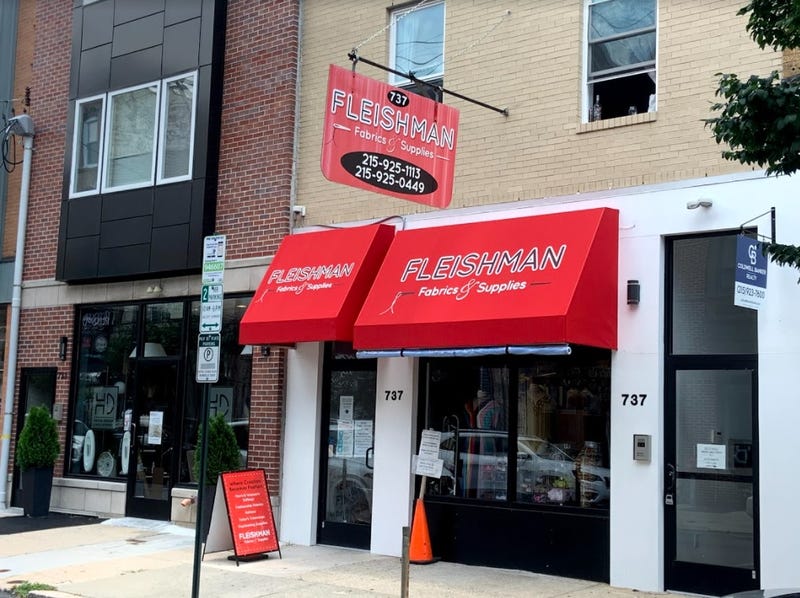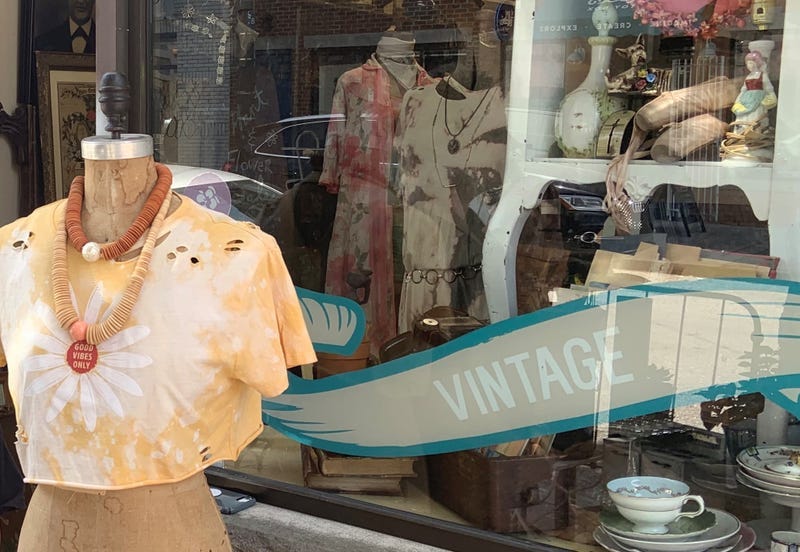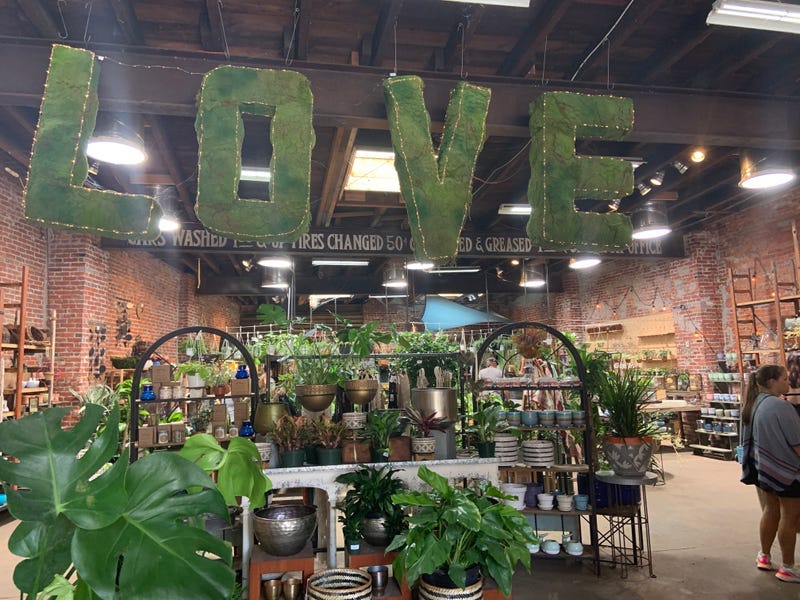KYW Newsradio's Community Comeback series checks in on Philadelphia neighborhoods and livelihoods to find out how small businesses made it through the pandemic and how they are surviving, and even thriving, today.
SOUTH PHILADELPHIA (KYW Newsradio) — In the 98 years that family-run Fabric Row anchor business Fleishman Fabrics and Supplies has operated, there has never been any 16-month period where more customers were greeted over the phone.
And the business, located at 737 South 4th Street in Queen Village, has never needed that phone more.
"I don't think I ever worked this hard," said owner Trish Fleishman. Her company was among the many Philly businesses in which necessity became the mother of re-invention.
They were able to operate as an essential business during the COVID-19 pandemic because of all the material they had on hand to make masks.
Fleishman said orders for medical cloth and other materials to make masks have been coming in from all over the country throughout this pandemic.
“Cotton, polypropylene interlining, and the blue medical cloth, that’s what people were coming in for, for four months. That’s all we sold strictly to make masks," she said.
In Fleishman's case, the necessity to re-invent their product line came at a perfect opportunity to meet available supply demands for the raw materials needed to make masks.

“We do a lot of buy-outs of warehouses, people going out of business. We had purchased part of this warehouse that did sewing for Hahnemann Hospital. Hahnemann closed, and we had these three huge bolts of blue medical cloth that we couldn’t give away. We were selling to painters or wherever, and it was in the warehouse," Fleishman noted.
"Then COVID hits and I’m like 'Wow, that blue medical cloth is something that people could use.'"
Cloth is half of what you need to make masks. The other part? Elastic.
"We happen to have the opportunity to purchase this quarter inch elastic, and [we] literally had elastic when Amazon was out of elastic,” Fleishman explained.
At a moment when they otherwise would have had to close their doors because of the pandemic, they had everything they needed to corner the much-needed mask market.
"So we applied for a waiver from the government to stay open," said Fleishman.
"We did shipping across the country ... I kid you not, from 7 a.m. to 10 p.m. non-stop we were shipping across the country."
Fleishman said that as the pandemic slowed down, the store's foot traffic eventually picked up again.
“It was a slow development of getting back to some sort of normalcy," she said.
"We started to let people in. First it was five at a time. I brought back employees part-time and we scattered them, so that everybody could have some time. It’s been kind of growing ever since, and developing and becoming almost what we were. But we are still wearing masks because we have people who work here who have little children that can’t be vaccinated, in order to really protect them."
Should the Philadelphia event calendar return to normal, Fleishman hopes some of their event-driven business returns as well, to replace all this mask-centered business they've picked up.
"We really service all of the theatrical entertainment companies. Drag queens are a big part of our business," she said.
"It used to be the Mummers. Hopefully it will be again."

Sometimes, the capability to re-invent in the face of necessity is limited to the tools you have on hand, as in the case of Fleishman's. But sometimes, being able to reach into your creativity can also lead to success.
Nicole Rae Styer tapped into her own creativity to pivot in the pandemic.
Styer, the owner of NRS Boutique at 1822 East Passyunk Avenue, took to her sewing machine to shift her product line and create unique masks to bring in revenue.
Unlike Fleishman's dependence on phone orders, internet sales allowed Styer's younger and smaller business to survive.
"I was really shipping out the masks, picking up the masks. I was shipping all over," said Styer.
“In the beginning, there was a mad rush to make masks, and that really kept me going like crazy.”
At first, medical professionals were Styer's main customers, but as the general public began to invest in masks, her clientele expanded.
“Of course in the beginning, there were a lot of nurses, doctors, hospitals. I was just donating," she said.
"Then there was just regular people wanting different, unique masks."
Styer created masks with things like sports motifs and more. She said her customers sought out to support small, locally-businesses like hers in East Passyunk, where independent shops are the lifeblood of the neighborhood.
"People wanted to shop from small businesses and wanted to see this community, this Avenue grow and keep it going,” Styer said.

“You know the 2020 word: Pivot," said Tara Alexander, co-owner of Urban Jungle, a garden store three blocks away from NRS Boutique at 1526 East Passyunk Avenue.
"You really had to think on your feet and think quickly, and figure out what we [could] do."
Just like Fleishman and NRS Boutique, she adjusted her product line. But instead of masks, made to block a virus from people's breath, people wanted a lot more of something that brings in oxygen: plants.
"I think people really loved plants, because they were home and they got to nurture things," Alexander explained.
"It really does make your environment brighter and happier and you just feel better, and so I think there are a lot of people still continuing look for that in their life.“
Alexander saw the demand grow for nature to nurture at home, desires for food, herbs, and a simply green environment. But with the pandemic, they got creative.
"We did grab bags," Alexander said.
"We put any where from four, five, six plants in a bag. You didn’t know what you were going to get and you came by and picked it up.”That theme of the unknown sounds familiar, considering the state of life over the last year and a half.
Organizations like the East Passyunk Avenue Business Improvement District, which serve NRS Boutique and Urban Jungle's neighborhood, have had to help small businesses who were at the ready to make such pivots with their product and much more.
That process is far from over.
“We still are technically in a pandemic, and we are still working with the businesses to continue to make it through," said East Passyunk Avenue BID Executive Director Adam Leiter.
"Our organization at this point is thankfully looking at the opportunity to have larger scale events and gatherings again, but we still want to do it in a way that it safe and hitting comfort levels for different people.”



